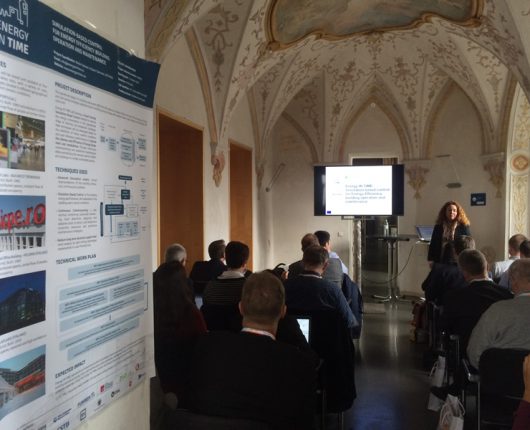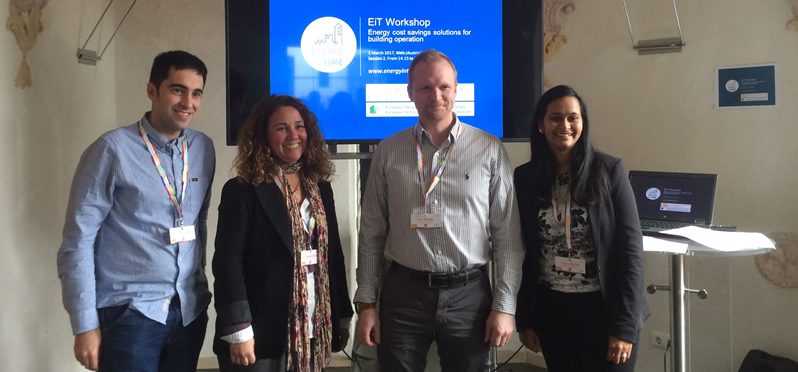At the beginning of March the Energy in Time Project had an excellent opportunity to hold another workshop, a 2-hour session, within the the World Sustainable Energy Days, which took place in Wels, Austria, on March, 1st and attracted around 700 participants from 59 countries. The focus of the workshop was put on the latest results and a specific knowledge related to energy efficiency applied to buildings.
The EiT session started with an overview of the Energy IN TIME project performed by Belen Gómez-Uribarri (ACCIONA Infrastructures), project coordinator. She also shared information about the EiT centralized Remote Control developed within the Project. The attendees could see how this system is able to integrate up to 13 different modules for building operation, ranging from data acquisition modules to exploitation and control modules, among others.
Another partner, Carlos Fernández (University of Granada), spoke about the concept of the EiT integrated solution for building control. He presented the strategies for generating operational plans and the related algorithms, concluding that “the selection of an Optimal Operational Plan can reduce costs and emissions while producing energy savings”. Mr. Fernández also showed the steps followed to implement Data Mining and Big Data techniques in buildings, which deal with processing of huge volumes of data in order to extract specific knowledge.

Changing external and internal factors of the buildings may produce deviations from the expected performances. These changes can be detected and corrected by the Model on Demand Control and Fault Adaptive Control, as presented by Tejaswinee Darure (University of Lorraine). The fault-adaptive control approach has been demonstrated on a four-zone office type building benchmark. The adaptation of the controller to the system and equipment level fault is achieved by online modification of the constraints in the model predictive control.
Finally, so as to verify the function of the developed systems in real buildings, Heikki Rostila (Caverion), summarized the actions performed in the project demo sites. The Optimal Operation Plan Generator (OPG) was implemented in all four demo sites, while other technologies, such as the Model on Demand Control and the permanent commissioning methodology, were been tested in the Santomalo pilot site at this stage. Predictive Maintenance was shown on the Levi pilot site.
The workshop proved to be a perfect place to share with the audience the latest findings to date at each location. In the upcoming months more testing will be done together with the energy savings evaluation. We expect to confirm a 20% energy consumption saving through our research carried out on the four pilot sites.
Stay tuned with EiT! We are always glad to share with you our findings.
Additional information
The World Sustainable Energy Days 2017
The European Research Conference: Buildings presents new research results on energy-efficient and sustainable buildings. Conference topics include novel materials, energy storage, building energy systems, smart buildings, high performance buildings, deep renovation, renewable energy and indoor air quality.
The conference is an integrated part of the World Sustainable Energy Days, one of Europe’s largest conferences on energy efficiency and renewable energy.
You can download the presentations here:
- Energy IN TIME- Simulation based control for Energy Efficiency building operation and maintenance (Acciona)
- EiT Integrated Solution for Building Control (Universidad de Granada)
- Automatic Operational Plans Generation (Universidad de Granada)
- Fault Diagnosis and Adaptive Control of VAV Dampers in a Multizone Building (University of Lorraine)
- Data Mining for Improving Building Operation (Universidad de Granada)
- Implementing and analysing EiT solutions in four demo sites (Caverion)











